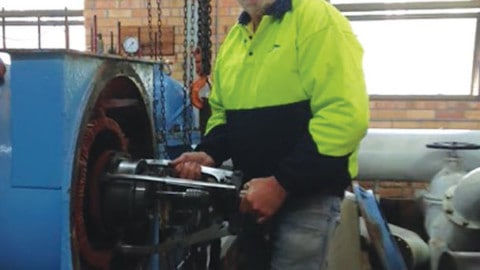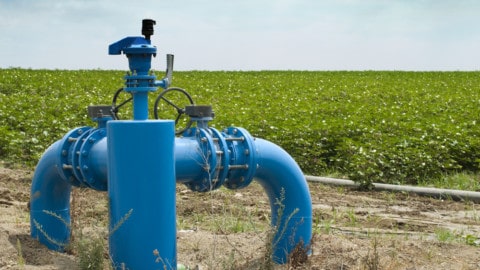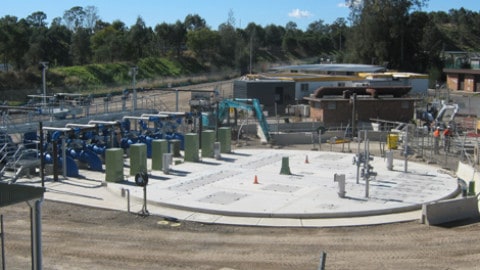In this pump end user interview, Lee Cunningham, Electrical Technical Officer at Ipswich City Council, and member of Pump Industry Australia’s (PIA) register of trained personnel, talks about the importance of training and the most pressing issues affecting the industry today.
Lee has completed the PIA’s design, installation and commissioning course, and has been able to apply the skills learnt in his current role, which he has been in for the last three years.
“With the opportunity to step up and take on the present challenges and apply the learnings gained so that I may confidently rectify a situation is absolutely satisfying,” Lee said.
“With a diverse range of industry involvement and assistance, we can greatly improve asset reliability and performance for all to enjoy.
“Thank you everyone for your greatly appreciated, valued insights.”
Lee believes that the facilitation of knowledge about pumps, such as through PIA training courses, is important in helping to solve what he sees as the biggest challenges facing the industry: improving knowledge and understanding the importance of ‘why pumps’.
“Without greater knowledge and understanding in how pumps provide for the greater community (domestic, commercial and industrial), it will be consistently overseen. Pumps are like electricity without the governing respect – abused and used, and great while it is working until it breaks down. The difference between pumps and electricity is that anyone can touch pumps, and they will touch them. No governance equals no quality,” Lee said.
“The importance of ‘why pumps’ collated with associated risks (e.g. the resultants if they stop working) also needs to be made clear so that everyone can understand the weight of great practices compared to that of poor practices. This will hopefully assist PIA to greater heights.”
Despite the challenges the industry is facing, Lee said the training the PIA provides and the work it undertakes ensures there is a good relationship between everyone in the industry, from end users to suppliers and manufacturers.
“For an industry that is struggling to set a compliance standard with the current conditions (lack of endorsed standards for compliance), this team is persistently providing greatness, providing teachings to all, augmenting the quality for the entire industry,” Lee said.
“Great focus and persistence by the team – thank you PIA!”
Reducing risks and improving efficiency
Lee said understanding the different considerations for correct pump selection is important in reducing risks and improving efficiency.
“The pumps’ surrounding environment and its accessibility for serviceability equate to improved efficiency,” Lee said.
“Regarding the environment, the pump must be able to handle the test of time whilst operating dependably with consistency – no different to a golfer that has the will to be a PRO.
“Serviceability is also important, especially in highly political areas where the pump has the utmost importance in needing to operate; these pumps, in the presence of a failure, need to be readily available for purchase and be practically simple to replace – the heavier the weight in importance the pump has, the easier it should be to deliver an outcome in an efficient manner.”
Lee said that energy efficiency also has a role to play in pump selection as long as it does not impede on operational performance.
“Great designs should always instill this way of thinking to achieve great outcomes.”
Also key to pump selection is ensuring good communication between the client and supplier.
“The key is to listen. The goal must be completely understood with all operational requirements known whilst incorporating all risk factors from both professions involved, this is the combination of both stakeholders and professional advisers alike. Understanding between both parties is paramount to great results,” Lee said.

Lee Cunningham with his son Zachary.
Keeping the pumps running
Lee said to ensure a state of stability and prevent disruption to the community, it is important to factor in the maintenance and repair schedule, and costs during project planning.
“This reflects true costs involved with a particular asset and its associated lifecycle – it may be cheap to purchase that product, but that product may also be extremely expensive to keep operational,” Lee said.
“Again, the complete lifecycle and costs associated capture the true costs involved.”
Lee said Ipswich City Council undertakes regular testing, and on-site servicing and maintenance of its pumps.
“Manufacturer specifications as well as environmental conditions (political and direct location impacts – e.g. chlorine/salt water) set the weight and tune to periodic requirements. Cost benefits outline all scenarios regardless of situation,” Lee said.
“Vibration, heat and noise; flow and pressure; continuity of earthing and winding components; insulation resistance; and operations, lifecycle, performance and cost efficiency testing is also completed.”

















